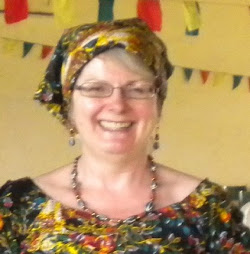At last, on Tuesday we saw our new home, in Foncha Street in Bamenda, and moved in!
Arrangements here, we've learned, are very flexible to say the least, and we are definitely learning to go with the flow. I'm sharing a house with another Welsh volunteer, Gweneira, for a few weeks anyway, and we'll be collaborating to some extent in our work.
Ibrahim, the VSO programme officer, and Kareen, the VSO long-term volunteer with whom I'm going to work, took us round to see the house. It's a nice size, 2 bedrooms, large lounge/dining area, small shower room and small kitchen. The laundry is out the back. We have cold running water, electricity, fridge and gas rings to cook. It's in a secure location with a yard surrounded by high walls, solid metal doors, window bars, gates and the row of houses has both a day and night guard.
Everything gets dirty so quickly that there was a layer of brown dust over everything, and leaking taps and toilet, with a lot of rubbish and stuff left by the previous tenant. So Ibrahim got on the phone to the cleaner recommended by previous VSO tenants, and she turned up within a few minutes. We struck a deal and went off for lunch and to collect our luggage.
Wow - what a difference after a few hours! Anne is a real treasure, sweet and hard-working. She'd cleaned the place over and washed all the sheets. Another call to Yusuf, a young neighbour, brought his help to get a new gas bottle and fix up our mosquito nets. He called a plumber - who came and fixed leaky things the following afternoon - would you believe it in Wales?
We've made the place our home - local cloths hanging on the walls, Welsh teddy bear, family pictures. Battling with the ants and cockroaches in the kitchen is non-stop, but no worse than in southern Europe (so far). We've shopped, eaten and drunk locally, introduced ourselves to people and started to make friends.
Our cleaner comes at 6:30 for an hour or so, but we wake soon after 5 anyway with the morning call to prayer from the muezzin, and a cock crowing. We do feel a bit strange sometimes, waking in the middle of the night when the rain hammered on the tin roof. But sitting here now, listening to Norah Jones on my laptop while we write up our journals, it feels so relaxed to be living in a house in Africa!








.jpg)
.JPG)
.jpg)
.jpg)
.jpg)
+(640x480).jpg)

+(480x640).jpg)




